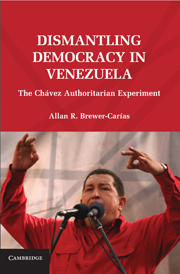Book contents
- Frontmatter
- Contents
- AUTHOR'S NOTE
- INTRODUCTION DEFRAUDING DEMOCRACY THROUGH NONCONSENSUAL CONSTITUENT ASSEMBLIES
- PART ONE THE POLITICAL ASSAULT ON STATE POWERS AND THE FRAMEWORK FOR AUTHORITARIANISM
- PART TWO INSTITUTIONAL DEVELOPMENT TOWARD CONSOLIDATING AUTHORITARIANISM
- PART THREE CONSTITUTIONAL REFORMS DESIGNED TO CONSOLIDATE AUTHORITARIANISM
- INDEX
PART TWO - INSTITUTIONAL DEVELOPMENT TOWARD CONSOLIDATING AUTHORITARIANISM
Published online by Cambridge University Press: 05 June 2012
- Frontmatter
- Contents
- AUTHOR'S NOTE
- INTRODUCTION DEFRAUDING DEMOCRACY THROUGH NONCONSENSUAL CONSTITUENT ASSEMBLIES
- PART ONE THE POLITICAL ASSAULT ON STATE POWERS AND THE FRAMEWORK FOR AUTHORITARIANISM
- PART TWO INSTITUTIONAL DEVELOPMENT TOWARD CONSOLIDATING AUTHORITARIANISM
- PART THREE CONSTITUTIONAL REFORMS DESIGNED TO CONSOLIDATE AUTHORITARIANISM
- INDEX
Summary
The 1999 Constitution established express provisions to construct a democratic rule-of-law state, based on the main following trends: first, the vertical distribution of state powers between territorial entities with self-government, according to the “federal decentralized” form of the state; second, the autonomy and independence of five different branches of government according to the principles of separation of powers; third, the attribution to an independent and autonomous Supreme Tribunal of Justice of the power to control the supremacy of the Constitution; and fourth, a mixed economic system that combines private initiative and economic freedom with state participation.
Nonetheless, and despite those express provisions, in practice, the institutions that have developed during the past decade – in many cases, manipulating constitutional provisions (Chapter 5) – have been used, first, to consolidate the centralized federation that the 1999 constitution-making process aimed to surpass, thus abandoning all the decentralization policies defined in the 1990s (Chapter 6); second, to concentrate power, blurring the principle of separation between the branches of government; third, to subject the Supreme Tribunal of Justice to the will of the executive (Chapter 7), converting its judicial review powers into an illegitimate means of distorting the Constitution (Chapter 8); and fourth, to establish a completely “statized” economy, by nationalizing, expropriating, and confiscating private assets and extinguishing private initiatives (Chapter 9), which has affected activities, enterprises, and assets in the oil, iron, steel, agriculture, electricity, telephone, and cement industries.
- Type
- Chapter
- Information
- Dismantling Democracy in VenezuelaThe Chávez Authoritarian Experiment, pp. 165 - 166Publisher: Cambridge University PressPrint publication year: 2010



